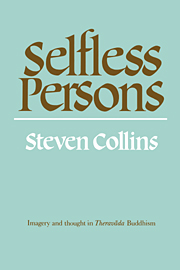Book contents
- Frontmatter
- Contents
- Dedication
- Preface
- Introduction
- Part I The cultural and social setting of Buddhist thought
- Part II The doctrine of not-self
- 3 The denial of self as ‘right view’
- 4 Views, attachment, and ‘emptiness’
- Part III Personality and rebirth
- Part IV Continuity
- Conclusion
- Notes
- Bibliography
- Glossary and index of Pali and Sanskrit terms
- General index
3 - The denial of self as ‘right view’
Published online by Cambridge University Press: 18 December 2009
- Frontmatter
- Contents
- Dedication
- Preface
- Introduction
- Part I The cultural and social setting of Buddhist thought
- Part II The doctrine of not-self
- 3 The denial of self as ‘right view’
- 4 Views, attachment, and ‘emptiness’
- Part III Personality and rebirth
- Part IV Continuity
- Conclusion
- Notes
- Bibliography
- Glossary and index of Pali and Sanskrit terms
- General index
Summary
This me is an empirical aggregate of things objectively known. The I which knows them cannot itself be an aggregate, neither for psychological purposes need it be considered to be an unchanging and metaphysical entity like the Soul, or a principle like the Pure Ego, viewed as ‘out of time’. It is a Thought, at each moment different from that of the last moment, but appropriative of the latter together with all that the latter called its own. All the experiential facts find their place in this description, unencumbered with any hypothesis save that of the existence of passing thoughts or states of mind.
William James (1950) pp. 400–1Different kinds of ‘right view’
In Chapter 2, I showed that although Buddhism finds certain ordinary uses of the words attā, purisa, and puggala unexceptionable, it objects strongly to their use in any theory which posits a real, permanent self or person as the agent behind action or the subject of experience. In Buddhist terminology such a theory is called a ‘view’ (ditthi); and there are two main ways in which Buddhist teaching seeks to counter what it sees as mistaken views. One approach, which might be described as quietistic, recommends exclusive concentration on religious practice, avoiding any speculative thought which goes beyond immediate questions of morality or meditation. I will deal with this approach, and the ‘silent wisdom’ to which it is held to lead, in Chapter 4.
- Type
- Chapter
- Information
- Selfless PersonsImagery and Thought in Theravada Buddhism, pp. 87 - 115Publisher: Cambridge University PressPrint publication year: 1982

